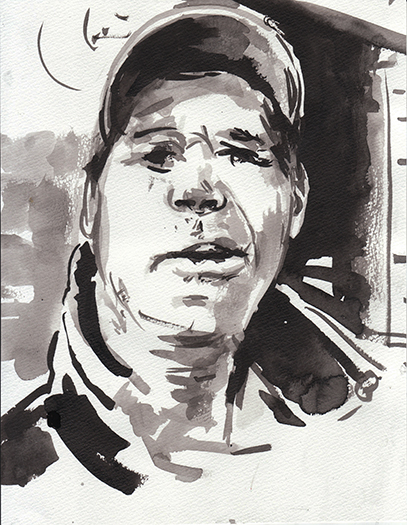Four days a week for the past two years, he’s stood in front of an underground bar just off Michigan Avenue.
Yes, he said. He has seen some crazy stuff.
“Crazy is just the half of it,” he said with a sideways smirk and a thick South Side accent. “I’ve got a college education and this is what I ended up doing.”
He’s got a Chicago-style sneer, a sniff in the air as if danger had a musk. He would look around and sniff, then return his gaze to me. Always suspicious, always on the look for people to invite into the bar and others to keep away.
He studied marketing at Indiana University.
“I came to Chicago because it’s the greatest city in the world,” he said with a cocky smirk.
He was in his 40s with a tan baseball cap advertising a golf club. He was tough-looking, tough-talking, a city accent and a chin jutting out as if to mark territory.
We stood on the sidewalk on a gorgeous strip of avenue in strip of town kept gorgeous and safe in hopes the wanderers and shoppers fund the alleys, neighborhoods and dead factories that make up the rest. I ask him what he’s seen.
“I see the good, the bad and the ugly,” he said.
“What’s some of the good?”
He looked down and tried to squelch a little smile.
“Just the vacationers,” he said. “People here that are just enjoying the city.”
“What’s some of the bad?”
He paused for a second as if gauging me.
“The Red Line when the minorities get off it and create- just want to screw with everybody.”
I move on. Quickly.
“And the ugly?”
“Ditto.”
I mumbled a question about what’s next for him, but by now he was tired of me, tired of being peppered with questions. He was tired of having his life poked and prodded just because he agreed to an interview.
He was tired of being looked at the way I must have been looking at him, like just another specimen of the casual Chicago racism that plagues this divided town, where colors of train routes can used as euphemisms for color of skin and everybody knows what you’re talking about.
Like any good doorman, he knew when to shut me out.
“The future is always in doubt,” he said to my question about what’s next. He wished me well and said “Bye bye.”
Read another Chicago street interview
